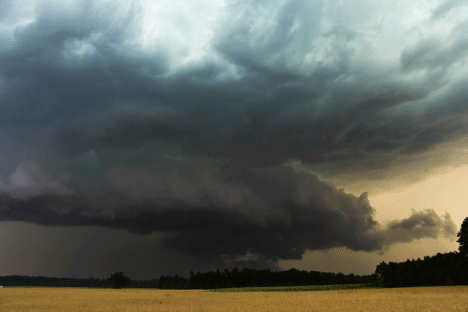The recent spate of extreme weather in Italy has severely disrupted agricultural activities, particularly in the Emilia-Romagna region. According to Coldiretti, Italy’s leading agricultural organization, the heavy rains and hailstorms have inundated tomato fields, blocked sowing operations, and caused extensive damage to fruit orchards, notably cherry plantations. This report provides the first comprehensive assessment of the storms’ impact on the region, which is still reeling from last year’s floods.
In regions such as Bassa Piacentina and Modena, the overflowing waterways have exacerbated the already dire situation. The timing of these floods, coinciding with the peak harvest season, has resulted in near-total crop losses. Coldiretti emphasizes that the damage extends beyond Emilia-Romagna, with significant agricultural infrastructure destruction reported in Veneto, where a tornado struck Rovigo, further impeding farming operations.
The persistent heavy rainfall has led to the accumulation of mud in fields, forcing many agricultural businesses to halt operations. This has created additional challenges for both open-field and greenhouse cultivation, where several centimeters of standing water have accumulated, threatening the viability of vegetable crops and other produce. Consequently, farmers are considering delaying the sowing of a second crop cycle, wherever feasible.
Coldiretti also highlights the contrasting weather conditions across Italy. While the north grapples with excessive rainfall, the south faces severe drought. This dichotomy underscores the critical issues in Italy’s agricultural infrastructure. For instance, in Sicily’s Caltanissetta province, sporadic water delivery has made irrigation a rare and costly resource. Similarly, in Molise, farmers have protested against exorbitant water tariffs, which equate agricultural water costs with those of potable water.
The situation in Apulia is equally dire, with acute water shortages hampering irrigation efforts. On Sardinia, Coldiretti has appealed to the Southern Land Reclamation Consortium for emergency water supply to safeguard approximately 400 hectares of farmland at risk due to water allocation cuts.
In response to these challenges, Coldiretti is advocating for immediate emergency measures to support affected farmers and bolster the country’s agricultural resilience. These measures include:
- Infrastructure Improvements: Investing in robust water management and irrigation infrastructure to mitigate the impacts of both floods and droughts.
- Emergency Financial Aid: Providing direct financial assistance to farmers to offset losses and support recovery efforts.
- Policy Interventions: Implementing fair water pricing policies and ensuring equitable distribution of water resources across regions.
The stark reality of Italy’s current agricultural crisis calls for urgent and coordinated action. By addressing these infrastructure deficiencies and supporting the farming community, Italy can better prepare for future climatic challenges and safeguard its vital agricultural sector.
The recent extreme weather events in Italy have highlighted the vulnerabilities in the agricultural sector, particularly regarding water management and infrastructure. Immediate intervention is necessary to support affected farmers and enhance the resilience of Italian agriculture. With strategic investments and policy reforms, Italy can mitigate the impacts of such crises and ensure a more sustainable agricultural future.































